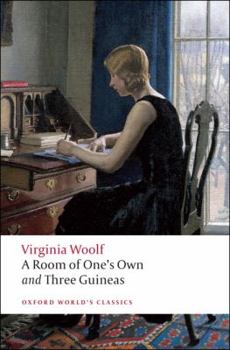A Room of One's Own; And, Three Guineas
Select Format
Select Condition 
Book Overview
'Intellectual freedom depends on material things. Poetry depends on intellectual freedom. And women have always been poor...'In these two classic essays of feminist literature, Woolf argues... This description may be from another edition of this product.
Format:Paperback
Language:English
ISBN:0199536600
ISBN13:9780199536603
Release Date:June 2008
Publisher:Oxford University Press, USA
Length:433 Pages
Weight:0.75 lbs.
Dimensions:0.8" x 5.0" x 7.7"
Customer Reviews
1 rating
My God What a Great book and What a Great Introduction
Published by Thriftbooks.com User , 17 years ago
This book contains two polemics or extended essays by Virginia Woolf plus some excellent comments in the introduction on her life and works. Woolf was a major force in the English publishing world after WWI. She wrote, she was a critic, and she published for such famous heavy-weights as Freud and T.S.Eliot. In addition, this book has an excellent introduction to Woolf and an overview of her ideas. The two essays are based on talks that she gave. I read this book three times in order to absorb all the information. The introduction and analysis are simply outstanding. The first non-fiction piece, "A Room of One's own," is better than the second. That second essay, "Three Guineas," is more of a general commentary. In short, this is a wonderful book with two good essays and one excellent analysis and commentary on Woolf. Woolf claims not to be a feminist. Instead she wants equality for women. These two polemics, especially the first, are opportunities for Woolf to vent all her frustrations about being treated as a second class citizen and to articulate her arguments, i.e.: she faced a barrier in the literary world as a woman. For example, she was denied a college education. The family money was spent on her brother's education, not hers, even though she was a brighter student. She had to learn Greek at home, etc. She describes much of the discrimination that she had to endure as a woman writer. Also, she describes other female writers and how they worked under primitive conditions and sometimes even with these primitive conditions were able to emerge as great writers: George Eliot, Jane Austen, etc. Woolf discusses the question: why was there no woman Shakespeare? That is a question asked by some but answered rather forcibly by Woolf. She points out that Jane Austen did not even have an office; Austen wrote her great novel such as Pride and Prejudice at the kitchen table. Austen worked in social isolation and died at a young age, as did Charlotte Bronte. How would they have developed if they had had longer lives or emerged as social forces? In the second piece she links some of the problems of the world to men and their aggressive behaviour. This is a great and entertaining read.





